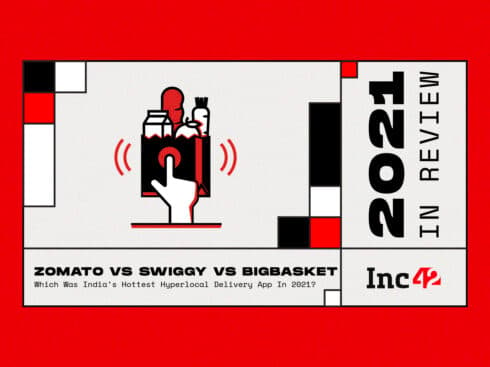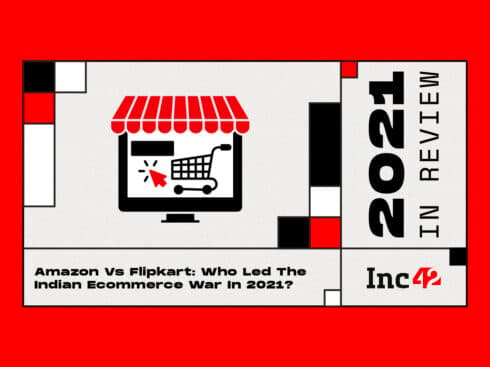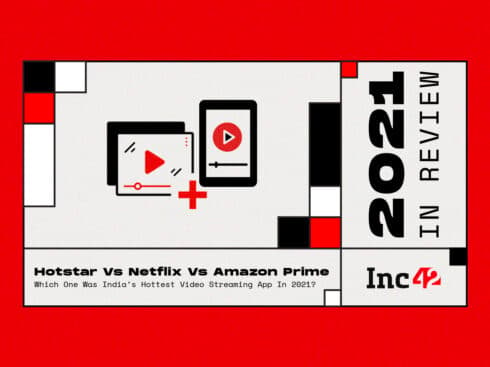Hike reached 100 Mn users in just four years — by end-2016 — but its user base hasn’t grown since then
Hike registered a 67% fall in its non-operating revenue in FY17 to INR 11 Cr ($1.5 Mn) from INR 34 Cr ($4.8 Mn) in FY16
Hike is yet to announce a monetisation model that can bring in revenues in a sustainable manner
Hike: The first homegrown chat messaging service that made it big in the era of foreign companies like Facebook Messenger, WhatsApp and Orkut
Sounds exciting, right?
Whenever we see an Indian company step into a battle with its foreign counterparts, the patriot in us tugs at our hearts (excuse us, but Independence Day just passed). But this feeling is fleeting — it doesn’t seem to be strong enough to urge Indian consumers to adopt homegrown brands — especially in a day and age where platforms such as WhatsApp, Instagram, Snapchat, and Facebook Messenger have already entrenched their roots deep into the community of Indian Internet users.
The same seems to have happened with Hike, a cross-platform messaging and voice over internet protocol (VOIP) service that also provides snackable content on the go.
Even after more than five years of its launch, Hike is struggling to rake in even revenues, let alone make profits.
This is the story of most Indian consumer Internet companies so far. And, to its credit, Hike does have some unique milestones to count.
Hike, which is valued at $1.4 Bn, is one of the fastest companies globally to enter the unicorn club. It reached the milestone in just three years and seven months.
Having raked in more than $261 Mn in five rounds of (disclosed) funding, the company has received more than its fair share of media attention for its announcements around new product launches, acquisitions (three of them), as well as partnerships.
However, Hike is yet to announce a monetisation model that can bring in revenues in a sustainable manner.
Thus, this week around, Inc42 Datalabs decided to delve into Hike’s financials and brainstorm the reasons for its failings as part of Inc42’s ongoing series What The Financials [WTF].
But before we go further, let’s take a look at a brief snapshot of Hike’s journey so far since its launch in December 2012 by Kavin Bharti Mittal, the son of Sunil Mittal, the founder and chairman of Bharti Airtel, India’s largest telecom company with a user base of over 350 Mn.
The Hike Downfall
Hike’s initial strategy, after launching in December 2012, was focussed around enticing the youth (who comprise 19% of India’s 1.3 Bn population) of the country by giving everything for ‘free’. This made Hike hugely popular within a short span.
The result? Hike reached 100 Mn users in just four years — by the end of 2016.
But after the rush of success, there was the lull of stagnancy. A year-and-half later, Hike’s userbase is still stuck at 100 Mn.
The Hike communication team confirmed the above figure to Inc42 in an email response. The company claimed that 90% of Hike users are between the age of 15-24 years at present.
In 2016, when media persons questioned Hike about its stagnant user base, founder Kavin Bharti Mittal contended that the company “needed a critical mass” before it could monetise.
More than a year has passed since then but there are no signs of Hike trying to monetise its offerings. At the same time, the company’s active user base is also falling.
Prime Causes For Concern: Reducing Operating Revenues & Rising Expenses
As observed by the Inc42 Datalabs team, Hike Pvt Ltd, which runs the mobile messaging application Hike Messenger, earned zero operating revenues in FY17, against INR 42 Lakh ($59.8 K) in FY16.
Further, the team also observed a 67% fall in its non-operating revenue in FY17 to INR 11 Cr ($1.5 Mn) from INR 34 Cr ($4.8 Mn) in FY16. This is quite drastic compared to the 752% increase in revenue that Hike Pvt Ltd saw in FY16 over FY15.
At the same time, the increase on the expense side is worth noting. In FY17, Hike Pvt Ltd recorded an increase of 56% in employee expenses (INR 92 Cr or $13.1 Mn), and 56% in maintenance cost (INR 21 Cr or $3 Mn).
Also, in the same year, it saw a 71% increase in the cost of services (INR 74.8 Cr or $10.6 Mn), which includes SMS and activation costs, web hosting charges, design and development charges, in-app costs, testing charges, and video usage cost.
This reflects that the rate of increase in employee and maintenance expenses was considerably lower in FY17 as compared with FY16. With zero operating revenues in your kitty for an entire fiscal year and such high expenses, the possibility of Hike achieving a break even came into question.
Further, Hike incurred an advertisement cost of INR 29 Cr ($4.14 Mn) in FY17 that has come down from INR 130 Cr ($18.5 Mn) in FY16. The increase in cost of service and reduction in advertisement might suggest Hike is being able to retain its customers better. (Is that so?)
Hike Is Bleeding, But Why?
With India considered to be a ‘freemium economy’, there can be a number of reasons for an Internet company to register losses in the wake of upcoming growth opportunities and rising competition in the space. But registering ZERO revenues in a financial year is something worth digging into.
Inc42 Datalabs figured out there are three main reasons for the drop in revenues for Hike.
Falling Active User Base
According to an article dated July 11, 2018, by The Ken, in the 18 months since its last funding round (in August 2016), Hike’s daily active users (DAU) metric has fallen by a whopping two-thirds—from 23 Mn to 8 Mn, according to app market tracker App Annie.
The Ken report further added, that in addition to the sharp fall of DAUs, monthly active users (MAUs) have declined by more than half—from 37 Mn to 18 Mn in the same period.
“Not only are these numbers alarming in absolute terms, they are alarming in percentage terms as well. The current ratio of DAU to MAU (8 Mn out of 18 Mn is 44%, a marked decline from the 62% (23 Mn out of 37 Mn) it was at eighteen months back. Even among the users who are still on the platform, usage is falling,” The Ken added.
The Long Awaited Monetisation Model
Like all major messaging apps worldwide, the services offered by Hike are completely free. Until FY16, Hike was earning its operating revenues through coupons that users bought to play in-app games, but gradually the company failed to build this up as a sustainable monetisation model.
The company is also quite aggressive in rolling out new products to keep its 100 Mn userbase engaged with new features. It is also eyeing a share of the untapped offline community of smartphone users.
In January this year, Hike introduced its new product, Total, to provide Indians with a refined, data-less way of staying in touch. Total enables users to access essential services such as messaging, news, recharge, and more without an active data connection. It also paves the way for them to start using data by providing packs at as low as INR 1.
Apart from this, Hike also offers:
- Integration with cab aggregator Ola on its platform
- A payment feature via Hike Wallet (as of December 2017 Hike Wallet had 25 Mn users and saw 10 Mn monthly transactions)
- New features such as Stories, Camera, and Live Filters, occasion-oriented stickers, and more
But again, all these new features are free. Unlike its western counterpart WhatsApp, Hike hasn’t rolled out any B2B service model such as WhatsApp Business. Also, while WhatsApp is capitalising on its global user base growth, for Hike, 95% of the users are Indian. And as we noted before, since 2016, the company has seen no growth in its existing userbase of 100 Mn.
Acquisitions Are Becoming More Of A Burden For Hike
In FY 2017, Hike made two acquisitions — hardware tech startup Creo Tech (to integrate Hike Wallet with other apps), and hyperlocal social networking app Pulse. It accommodated the entire teams of both the startups, increasing its employees by a large number.
Thus, the company was forced to take a corrective measure here. Earlier this year, it announced planned to lay off 20-25% of its workforce and, thereafter, handed over pink slips to 50-75 employees across various locations.
A Hike spokesperson confirmed the layoffs and accepted that the acquisitions had skyrocketed the team size, mostly in Bengaluru. He also said that the company was in the process of integrating and streamlining these teams.
Will Hike Monetise In The Near Future?
In January, Kavin Bharti Mittal said that his goal was to start thinking about monetising in 2018, experiment with monetisation in 2019, and, hopefully, make a meaningful revenue model in 2020.
He also said that the $175 Mn raised by Hike “is like Flipkart raising $1 Bn. That’s the value we see and we are the only local rich messaging app with scale in the country.”
The loss in (or rather lack of) revenues may not really impact the functioning of the company as it is heavily backed by deep-pocketed investors.
But the question here is: Until when can Hike survive on investors’ money? And, can a sustainable revenue-generating monetisation model be created overnight?
The answers to both of the above questions are negative. Hike can’t go on burning investor money forever. And the way its revenues are dipping — a 67% fall from FY16 to FY17 — it doesn’t seem anywhere close to changing its growth trajectory, especially with a stagnant user base.
Add to that the fact that competitors such as WhatsApp have taken the first-mover’s advantage in creating a revenue stream for themselves in India, while Hike hasn’t got its monetisation strategy in place, even after five years of being around.
Mittal’s plan of starting to look at monetising by 2020 may just be too late for Hike. And if 100 Mn users is not “critical mass”, we don’t know what is.
[This is part of the What The Financials (WTF) series of Inc42 Datalabs, in which we explore the financial health of startups and discuss their key metrics of growth. The data has been taken from MCA filings. To read more articles click here.]




![[WTF] With No Monetising Plan In Place Till 2020, Hike Messenger May Just Have To Go Take A Hike](https://inc42.com/cdn-cgi/image/quality=75/https://asset.inc42.com/2018/08/What-tha-financials.jpg)








![[What The Financials] With No Monetisation Plan In Place Till 2020, Hike Messenger May Just Have To Go Take A Hike-Inc42 Media](https://asset.inc42.com/2023/09/featured.png)
![[What The Financials] With No Monetisation Plan In Place Till 2020, Hike Messenger May Just Have To Go Take A Hike-Inc42 Media](https://asset.inc42.com/2023/09/academy.png)
![[What The Financials] With No Monetisation Plan In Place Till 2020, Hike Messenger May Just Have To Go Take A Hike-Inc42 Media](https://asset.inc42.com/2023/09/reports.png)
![[What The Financials] With No Monetisation Plan In Place Till 2020, Hike Messenger May Just Have To Go Take A Hike-Inc42 Media](https://asset.inc42.com/2023/09/perks5.png)
![[What The Financials] With No Monetisation Plan In Place Till 2020, Hike Messenger May Just Have To Go Take A Hike-Inc42 Media](https://asset.inc42.com/2023/09/perks6.png)
![[What The Financials] With No Monetisation Plan In Place Till 2020, Hike Messenger May Just Have To Go Take A Hike-Inc42 Media](https://asset.inc42.com/2023/09/perks4.png)
![[What The Financials] With No Monetisation Plan In Place Till 2020, Hike Messenger May Just Have To Go Take A Hike-Inc42 Media](https://asset.inc42.com/2023/09/perks3.png)
![[What The Financials] With No Monetisation Plan In Place Till 2020, Hike Messenger May Just Have To Go Take A Hike-Inc42 Media](https://asset.inc42.com/2023/09/perks2.png)
![[What The Financials] With No Monetisation Plan In Place Till 2020, Hike Messenger May Just Have To Go Take A Hike-Inc42 Media](https://asset.inc42.com/2023/09/perks1.png)

![[What The Financials] With No Monetisation Plan In Place Till 2020, Hike Messenger May Just Have To Go Take A Hike-Inc42 Media](https://asset.inc42.com/2023/09/twitter5.png)
![[What The Financials] With No Monetisation Plan In Place Till 2020, Hike Messenger May Just Have To Go Take A Hike-Inc42 Media](https://asset.inc42.com/2023/09/twitter4.png)
![[What The Financials] With No Monetisation Plan In Place Till 2020, Hike Messenger May Just Have To Go Take A Hike-Inc42 Media](https://asset.inc42.com/2023/09/twitter3.png)
![[What The Financials] With No Monetisation Plan In Place Till 2020, Hike Messenger May Just Have To Go Take A Hike-Inc42 Media](https://asset.inc42.com/2023/09/twitter2.png)
![[What The Financials] With No Monetisation Plan In Place Till 2020, Hike Messenger May Just Have To Go Take A Hike-Inc42 Media](https://asset.inc42.com/2023/09/twitter1.png)




 Ad-lite browsing experience
Ad-lite browsing experience